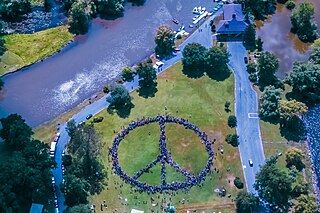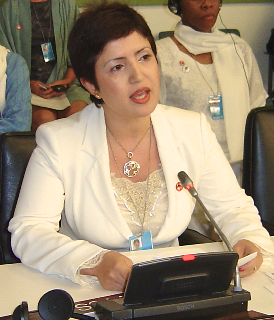Related Research Articles
A peace commission is an organization that operates at a local, regional, or national level within a country to reduce, counter, or prevent conflict. Typically, a peace commission will involve local communities and individuals in the peace building process. A Truth and reconciliation commission is a form of Peace Commission that discovers and reveals past wrongdoings in the hope of resolving conflict left over from the past. The South African Truth and Reconciliation Commission is an example. A commission such as the Southern Sudan Peace Commission is less concerned with the past, and more with finding ways to prevent ongoing ethnic violence from escalating, but instead to move towards a more peaceful society.

A truth commission, also known as a truth and reconciliation commission or truth and justice commission, is an official body tasked with discovering and revealing past wrongdoing by a government, in the hope of resolving conflict left over from the past. Truth commissions are, under various names, occasionally set up by states emerging from periods of internal unrest, civil war, or dictatorship marked by human rights abuses. In both their truth-seeking and reconciling functions, truth commissions have political implications: they "constantly make choices when they define such basic objectives as truth, reconciliation, justice, memory, reparation, and recognition, and decide how these objectives should be met and whose needs should be served".

Peacebuilding is an activity that aims to resolve injustice in nonviolent ways and to transform the cultural and structural conditions that generate deadly or destructive conflict. It revolves around developing constructive personal, group, and political relationships across ethnic, religious, class, national, and racial boundaries. The process includes violence prevention; conflict management, resolution, or transformation; and post-conflict reconciliation or trauma healing before, during, and after any given case of violence.
The Wagalla massacre was a massacre of ethnic Somalis by the Kenyan Army on 10 February 1984 in Wajir County, Kenya. Daniel arap Moi opened barracks near Wagalla, where he brought soldiers to 'discipline the villagers irrespective of age'.
Dekha Ibrahim Abdi was a Kenyan peace activist based in Mombasa, Kenya. She worked as a consultant to government and civil society organisations. She was of Somali ethnicity.

Widad Akreyi is a Kurdish health expert and human rights activist. She has co-founded the human rights organization Defend International and is the author of several books about both health issues and human rights.

The Solomon Islands Truth and Reconciliation Commission (TRC) is a commission officially established by the government of Solomon Islands in September 2008. It has been formed to investigate the causes of the ethnic violence that gripped Solomon Islands between 1997 and 2003. The Truth and Reconciliation Commission is the first of its kind in the Pacific Islands region.
Environmental peacebuilding examines and advocates environmental protection and cooperation as a factor in creating more peaceful relations. Peacebuilding is both the theory and practice of identifying the conditions that can lead to a sustainable peace between past, current or potential future adversaries. At the most basic level, warfare devastates ecosystems and the livelihoods of those who depend on natural resources, and the anarchy of conflict situations leads to the uncontrolled, destructive exploitation of natural resources. Preventing these impacts allows for an easier movement to a sustainable peace. From a more positive perspective, environmental cooperation can be one of the places where hostile parties can sustain a dialogue, and sustainable development is a prerequisite for a sustainable peace.

Leymah Roberta Gbowee is a Liberian peace activist responsible for leading a women's nonviolent peace movement, Women of Liberia Mass Action for Peace that helped bring an end to the Second Liberian Civil War in 2003. Her efforts to end the war, along with her collaborator Ellen Johnson Sirleaf, helped usher in a period of peace and enabled a free election in 2005 that Sirleaf won. She, along with Ellen Johnson Sirleaf and Tawakkul Karman, were awarded the 2011 Nobel Peace Prize "for their non-violent struggle for the safety of women and for women's rights to full participation in peace-building work."
Reparations are broadly understood as compensation given for an abuse or injury. The colloquial meaning of reparations has changed substantively over the last century. In the early 1900s, reparations were interstate exchanges that were punitive mechanisms determined by treaty and paid by the surrendering side of conflict, such as the World War I reparations paid by Germany and its allies. Reparations are now understood as not only war damages but also compensation and other measures provided to victims of severe human rights violations by the parties responsible. The right of the victim of an injury to receive reparations and the duty of the part responsible to provide them has been secured by the United Nations.
Concordis International is a non-profit organisation that works alongside and in support of official peace processes, where they exist, to improve the potential for lasting peace. The organisation has headquarters in London and country-offices in the Central African Republic and in Nouakchott, Mauritania. Concordis' historical roots are in peacebuilding work by the Newick Park Initiative in South Africa (1986–91) and in post-genocide Rwanda (1994-7).
Center for Justice and Peacebuilding (CJP) is an accredited graduate-level program founded in 1994. It also offers non-credit training. The program specializes in conflict transformation, restorative justice, trauma healing, equitable development, and addressing organizational conflict. CJP is housed at Eastern Mennonite University (EMU) in Harrisonburg, Virginia, which describes itself as "a leader among faith-based universities" in emphasizing "peacebuilding, creation care, experiential learning, and cross-cultural engagement." One of the three 2011 Nobel Peace Laureates, Leymah Gbowee of Liberia, earned a master's degree in conflict transformation from CJP in 2007.
The Truth, Justice and Reconciliation Commission of Kenya (TJRC) was established in 2008. Kenya’s modern history has been marked not only by liberation struggles but also by ethnic conflicts, semi-despotic regimes, marginalization and political violence, including the coup d'état of 1982, the Shifta War, and the 2007 Post-election violence.

Hizkias Assefa (1948) is a conflict mediator known widely in Africa for his non-aligned work as a consultant who has mediated in most major conflict situations in sub-Saharan Africa in the past 20 years, as well as in a dozen countries elsewhere. He is also a professor of conflict studies. Of Ethiopian origin, he is based in Nairobi, Kenya. He was one of the founding faculty members in 1994 of the Conflict Transformation Program at Eastern Mennonite University.
Emmanuel Bombande is a conflict resolution, peacebuilding, and development professional from Accra, Ghana, and is the Chair of the Board of the Global Partnership for the Prevention of Armed Conflict.
The West Africa Network for Peacebuilding (WANEP) is a leading Regional Peacebuilding organisation founded in 1998 in response to civil wars that plagued West Africa in the 1990s. Over the years, WANEP has succeeded in establishing strong national networks in every Member State of ECOWAS with over 550 member organisations across West Africa. WANEP places special focus on collaborative approaches to conflict prevention, and peacebuilding, working with diverse actors from civil society, governments, intergovernmental bodies, women groups and other partners in a bid to establish a platform for dialogue, experience sharing and learning, thereby complementing efforts at ensuring sustainable peace and development in West Africa and beyond.
The Nakuru County Peace Accord refers to the peace agreement signed on 19 August 2012 between elders of the Agikuyu and Kalenjin communities as well as other ethnic groups of Kenya.
The Sierra Leone's Truth and Reconciliation Commission was a truth commission created as part of the Lomé Peace Accord, which ended the 11-year civil war conflict in Sierra Leone in July 1999.
The Truth and Reconciliation Commission was a truth commission which ran from July 2003 - February 2007 to investigate and promote national unity as a response to the atrocities committed in the war in the Democratic Republic of Congo between the Congolese army, Congolese rebels, and foreign insurgents.
Anisia Karlo Achieng Olworo is a South Sudanese MP and women's rights activist.
References
- 1 2 "Tecla Wanjala-Kenya" . Retrieved 15 September 2014.
- ↑ "The Kenya National Dialogue and Reconciliation" (PDF). Building a Progressive Kenya. Nairobi, Kenya: Kofi Annan Foundation. 5 December 2011. Retrieved 19 September 2014.
- ↑ Wanjala, Tecla (2002), "Women as Peace Builders in Africa", Global Peace, Security, and Human Rights, Global Peace, Security, and Human Rights, Santa Barbara, California: University of California, Santa Barbara
- ↑ "Peace Women Across the Globe" . Retrieved 22 September 2014.
- ↑ "TJRC Report - May 2013".
- ↑ "Tecla Wanjala" . Retrieved 22 September 2014.
- ↑ Tecla, Wanjala (8–9 October 2014). http://www.catholicethics.com/news/call-for-papers-international-conference-on-peace-and-international-relations. Transitional Justice in Post-conflict Societies in Africa. Nairobi, Kenya: Hekima Institute of Peace Studies and International Relations (HPSIR) A constituent college of The Catholic University of Eastern Africa (CUEA). Retrieved 15 September 2014.
{{cite conference}}:|url=missing title (help) - ↑ Report of the Truth, Justice and Reconciliation Commission. Vol. I. Nairobi, Kenya: Truth, Justice and Reconciliation Commission, Kenya. May 2013. p. 252.
- ↑ Report of the Truth, Justice and Reconciliation Commission. Vol. IIA. Nairobi, Kenya: Truth, Justice and Reconciliation Commission, Kenya. May 2013. p. 782.
- ↑ Report of the Truth, Justice and Reconciliation Commission. Vol. IIB. Nairobi, Kenya: Truth, Justice and Reconciliation Commission, Kenya. May 2013. p. 448.
- ↑ Report of the Truth, Justice and Reconciliation Commission. Vol. IIC. Nairobi, Kenya: Truth, Justice and Reconciliation Commission, Kenya. May 2013. p. 382.
- ↑ Report of the Truth, Justice and Reconciliation Commission. Vol. III. Nairobi, Kenya: Truth, Justice and Reconciliation Commission, Kenya. May 2013. p. 152.
- ↑ Report of the Truth, Justice and Reconciliation Commission. Vol. IV. Nairobi, Kenya: Truth, Justice and Reconciliation Commission, Kenya. May 2013. p. 194.